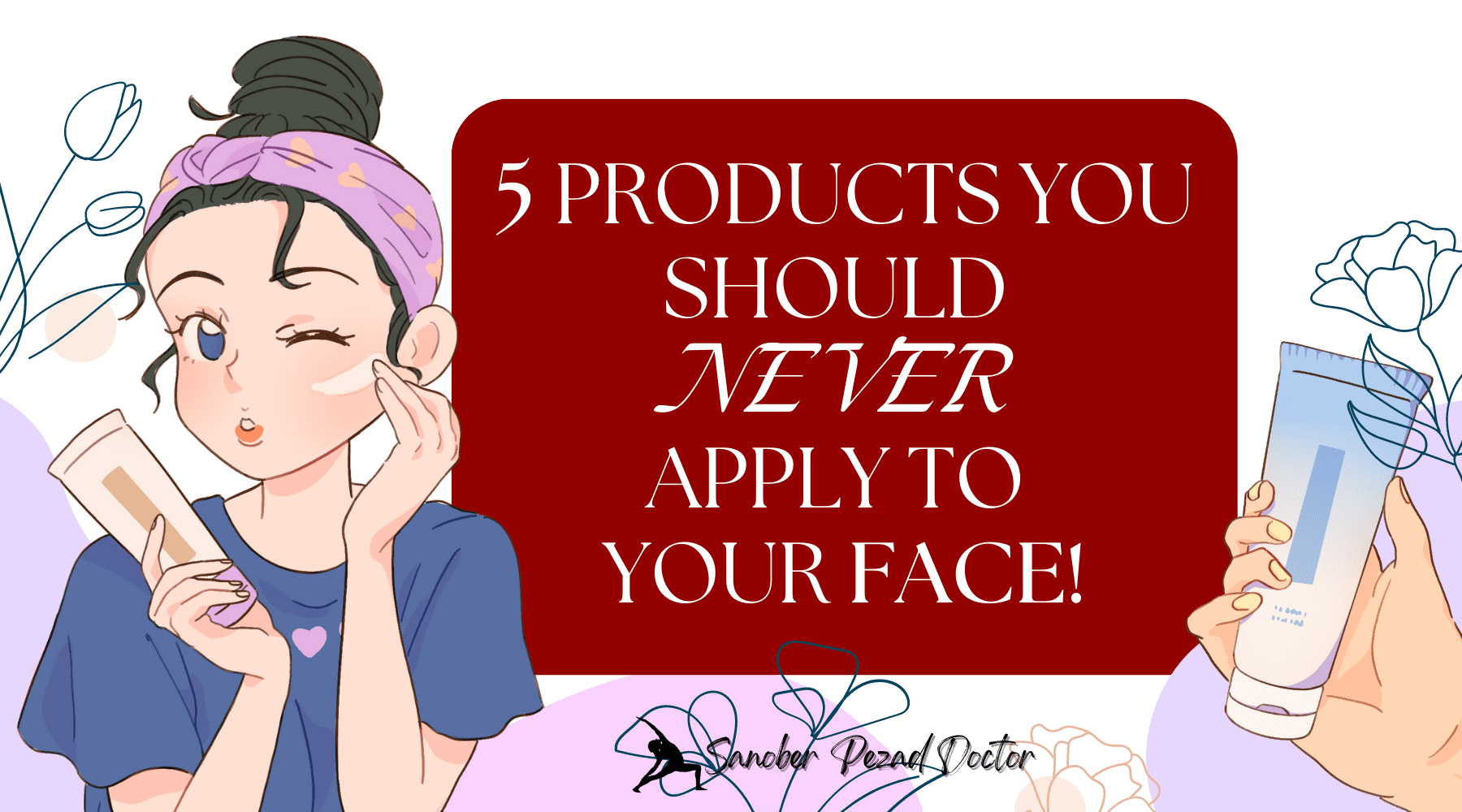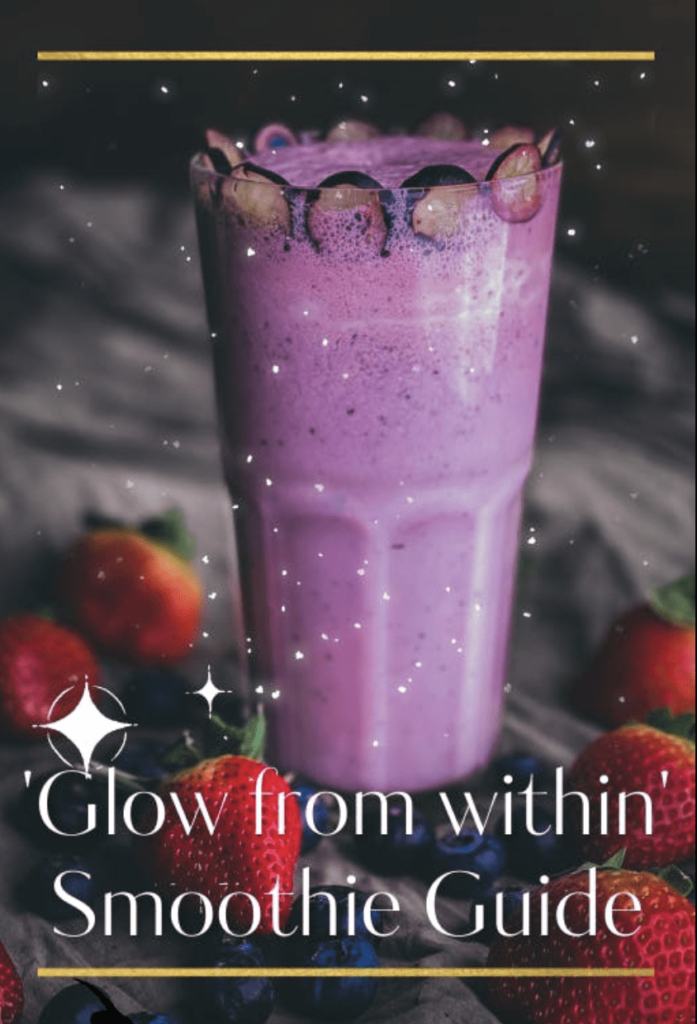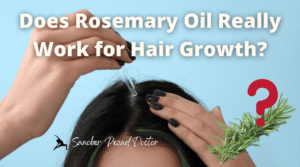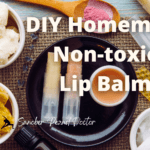5 Products You Should NEVER Apply To Your Face!

Everyone desires healthy and attractive skin, you’re not alone. And everyone hopes to keep their skin beautiful for as long as possible.
But the internet is loaded with DIYs and skincare recommendations which have the potential to do harm if not done with the right knowledge.
Here is a list of the 5 most common things I have come across in my practice, that I do NOT recommend using over the face.
5. Why You Should NOT Apply Petroleum Jelly to Your Face?
I know this one is controversial & the slugging trend does not seem to be dying off yet. But I thought this simple, inexpensive skincare product deserves a mention. I know of people who swear by it, but with all due respect to all the amazing benefits it might have, I certainly do not recommend applying petroleum jelly to all skin types especially over the face on a daily basis.
Petroleum jelly is exactly what it sounds like- a gel-like byproduct of petroleum, which is a form of crude oil. In fact, it was first discovered by oil rig workers who noticed it building up on the machinery and in the bottom of empty oil barrels. [1] The workers began putting this semi-solid substance on cuts and bruises, & noticed it sealed their wounds. Word traveled fast about its apparent wonders, and the substance was branded and sold as what we know very famously to be ‘Vaseline’.
Petroleum Jelly merely occludes the skin barrier, trapping the already existent moisture content and preventing further water loss. It also traps the commensal organisms present over the skin. By now, you are well aware that I am very fond of our skin buddies- the bacteria & fungi present over the surface of the skin. We really have a lot to thank them for, but they do not like when we disturb their balance & harmony. Using petroleum jelly on a consistent basis can cause an imbalance & lead to clogged pores, and yeast overgrowths in the long run.
Now there are some brilliant and very helpful uses of petroleum jelly, including some over the face, but I do not like using it in place of a moisturizer. Period.
Great Facial Moisturing Options:
- Anovite: Cream and Serum Duo
- Plant Therapy: Facial serum trio set
- Kora Organics: Noni Glow Face Oil
- KORA Organics Noni Night AHA Resurfacing Serum
4. Why You Should NOT Apply a Body Moisturizer to Your Face?
I get asked more often than not, whether it is fine to use the same moisturizer over our face and body. The short answer is NO!
It isn’t just a marketing gimmick, you can actually find a big bottle of body lotion with relatively clean and safe ingredients in your grocery store. But there is a reason why there is a lot of effort taken to formulate a moisturizer, especially for the face.
Our facial skin is thinner and more sensitive as compared to the rest of the body. The skin over your back and palms are the thickest, so you can get away by using more occlusive lotions and creams. Moisturizers specially designed for use over the face tend to be more lightweight and do not clog your pores. Hence, the chances of breaking out are negligible. They may also contain more expensive anti-aging ingredients added to them. But keep in mind that more expensive skin care products are not necessarily more effective! There is a lot more that has to be taken into consideration.
3. Why You Should NOT Apply Bar Soap to Your Face?
At any given consultation and appointment, I typically discuss with my client their at-home skin care regimen and what products they use. I am not going to lie, when I hear someone say they use bar soap on their face, I cringe. Whether you use bar soap out of habit or convenience, let me explain why it does more damage than good.

Before we go any further, I want to take a moment to explain what I mean when I refer to the term- pH (since we will refer to it very commonly henceforth). You may remember from your chemistry class, that potential of hydrogen, or pH (‘p of h’ as it is pronounced), is the measure of the hydrogen ion concentration of a solution. This was my geeky jargon rambling but what it basically does, is help us identify if a substance is acidic, neutral, or alkaline.
On a normal basis, our skin’s pH is slightly acidic (pH 4-4.5). Most bar soaps are alkaline, meaning they have a higher pH (pH>7), which causes the skin to be stripped of its natural oils and dry out. The higher the pH of bar soap, the more it will dry out your skin.
I have some argue that certain bar soaps are free of fragrances and other ingredients that typically irritate the skin, making them gentler on your skin. But they are all still too drying compared to the liquid, foam, or cream facial care products. The binders that hold a bar of soap together naturally have a higher pH than the products which are formulated specifically for cleansing the face.
Using a bar soap can damage the outer protective layer of your skin. This leads to accentuated wrinkles and pores and can cause acne and inflammation, which makes breakouts worse.
This doesn’t mean that all soaps are necessarily harmful to the skin. Some specialty soaps such as herb-based ones or handmade Syndets specifically for the face can be an option.
So, the next time you wash your face, put down the bar soap and reach for a true facial cleanser instead. Your skin will thank you!
Great Cleanser Options for most skin types:
2. Why You Should NOT Apply Toothpaste to Your Face?
I was honestly shocked when I learned that there are so many who have tried toothpaste over their face, especially as an attempt to treat acne.
I’m not sure how this started. I really believe there should be a kind of review process on social media as well. I have seen a lot of crazy stuff being shown, probably in an attempt to go viral. But I hope people know what is just meant to amaze & entertain and what is true advice. Nonetheless, keeping the social police aside, if you believed that dabbing some regular old toothpaste on your zit will help it clear up overnight, think again. While it’s true that several ingredients found in toothpaste are drying to the skin and might help shrink a pimple. We’re talking about baking soda, alcohol, hydrogen peroxide, and sodium laureth sulfate, to name a few. But this home remedy for breakouts is definitely NOT worth the risk.
Remember, toothpaste is formulated for your teeth, not the sensitive surface of your face. So, while the strength of the chemicals in your toothpaste might be safe on your pearly whites, they could be too strong for your skin. Similar to bar soaps, toothpaste has an alkaline pH. This can irritate healthy skin. Also, sodium lauryl sulfate, another ingredient often found in toothpaste, along with other harsh chemicals can cause redness, and irritation, and leave post-inflammatory hyperpigmentation, especially in Skin of Color.
If you are experiencing a pre-menstrual acne breakout or those that we often get once in a while, it is better to simply leave it alone instead of trying unreliable DIY remedies. Trust me it will resolve on its own. For faster resolution using over-the-counter benzoyl peroxide, and topical retinoids will work wonderfully as well. But remember, if you experience regular breakouts, you need to assess the underlying cause as merely applying topical medications won’t work.
1. Why You Should NOT Apply Lemon Juice to Your Face?
I have seen innumerable DIYs using limes or lemons for their depigmenting properties. Sure, lemon juice contains a lot of ingredients that are used in skincare such as Vitamin C, citric acid- an alpha hydroxy acid, (something you might be familiar with if you have got a ‘chemical peel’ done at your dermatologist’s office) and niacin. But before you rub a lemon on your face, there are a few issues you should be aware of.
By now, you have it etched in memory that the human skin comes with an inbuilt protective acid mantle that maintains a pH of 4 to 5, which makes it an inhospitable environment for pathogenic bacteria to thrive while still allowing our good fellows to survive. The reason I am stressing this fact is that we have been blessed with in-built mechanisms to keep acne and infections away and this acidic skin barrier is an excellent 1st line of defense against allergens and organisms of all kinds.
Lemon juice, on the other hand, has a pH of 2, which makes it extremely acidic. Putting pure lemon juice on the skin will disrupt the skin’s acid balance, thereby destroying its immunity to environmental toxins and causing a significant amount of.
Lemons also contain the chemical compounds- furocoumarins and psoralens, that react with sunlight. This can lead to a photo-toxic reaction which results in nasty blisters and rashes that is very similar to a chemical burn. There are numerous stories of people who have gotten lemon juice on their skin and developed blistering burns after going out into the sun!
Now, I did not want to scare you but you need to see the repercussions of a possible DIY going wrong. So, the next time a beauty writer or creator advises you to put lemon juice on your face, do NOT pay heed to their advice and run far far away.
DIY lemon juice skincare has also been linked to chemical leukoderma, where patches of skin depigment. That means you lose all skin color from that area and the skin turns white as we see in albinism.

As we see in the image above, a 61-year-old woman developed many light-colored patches on her face and neck after applying a lemon toner in her attempt to eliminate freckles and age spots.
I want to stress once more about the possible harmful effects of various DIYs that are demonstrated and recommended.
Use your judgment before you experiment on your own and always seek the advice of your doctor before you start anything new.
In case you’ll are wondering what you’ll do to achieve flawless skin instead, don’t forget to download my coveted- ‘Glow from within’ Smoothie Guide, where I share simple recipes that will nourish your body from the inside to leave you glowing from within.
Let me know of any other products that you are aware of or have experience with. This is an important topic and we need to shed more light on it to create adequate awareness.
Till then,
Continue to glow, thrive and shine as always.
Sending lots of healthy and happy wishes your way. ?
P.S.- If you like what I share, consider Subscribing to stay connected. I do NOT spam. Promise! ?
Also, please leave a comment and share the article with your loved ones. Sharing is Caring!
Feel free to ask a question or leave a suggestion as well. I am always open to learning. ?
References
- Mioduszewski M, Beecker J. Phytophotodermatitis from making sangria: a phototoxic reaction to lime and lemon juice. CMAJ. 2015;187(10):756. doi:10.1503/cmaj.140942
- Hankinson A, Lloyd B, Alweis R. Lime-induced phytophotodermatitis. J Community Hosp Intern Med Perspect. 2014;4(4):10.3402/jchimp.v4.25090. Published 2014 Sep 29. doi:10.3402/jchimp.v4.25090
- Safran T, Kanevsky J, Ferland-Caron G, Mereniuk A, Perreault I, Lee J. Blistering phytophotodermatitis of the hands after contact with lime juice. Contact Dermatitis. 2017;77(1):53-54. doi:10.1111/cod.12728
- Robl M, Robl R, Marinoni LP, et al Assemble the puzzle: bizarre-looking lesionsArchives of Disease in Childhood 2013;98:915.
- Marcos LA, Kahler R. Phytophotodermatitis. Int J Infect Dis. 2015;38:7-8. doi:10.1016/j.ijid.2015.07.004








Comments
What a great and important post! I had no idea the history behind petroleum jelly. I tried “slugging” with it once and I absolutely hated how my skin felt afterwards, I bet this is why! Thanks for sharing such great thoughts.
Thank you, Valery. Some people are still very fond of slugging!
Wow! A lot of great info. I didn’t even realize some of these things were trends.
I get surprised myself when I learn about some of them. Hence decided to educate and share my opinion. Thank you for your kind words!
I found myself shuddering as I read this. Vasoline? Toothpaste? Lemon juice! Yikes! I love the smoothie idea as they changed my life!
Haha! Yeah. I was surprised to know but people try all sorts of things! We need to share the right information and make everyone aware.